[fusion_builder_container hundred_percent=”no” equal_height_columns=”no” menu_anchor=”” hide_on_mobile=”small-visibility,medium-visibility,large-visibility” class=”” id=”” background_color=”” background_image=”” background_position=”center center” background_repeat=”no-repeat” fade=”no” background_parallax=”none” parallax_speed=”0.3″ video_mp4=”” video_webm=”” video_ogv=”” video_url=”” video_aspect_ratio=”16:9″ video_loop=”yes” video_mute=”yes” overlay_color=”” overlay_opacity=”0.5″ video_preview_image=”” border_size=”” border_color=”” border_style=”solid” padding_top=”” padding_bottom=”” padding_left=”” padding_right=””][fusion_builder_row][fusion_builder_column type=”1_1″ layout=”1_1″ background_position=”left top” background_color=”” border_size=”” border_color=”” border_style=”solid” border_position=”all” spacing=”yes” background_image=”” background_repeat=”no-repeat” padding=”” margin_top=”0px” margin_bottom=”0px” class=”” id=”” animation_type=”” animation_speed=”0.3″ animation_direction=”left” hide_on_mobile=”small-visibility,medium-visibility,large-visibility” center_content=”no” last=”no” min_height=”” hover_type=”none” link=””][fusion_text] The Foundation in Science ((FiS) course at the International Medical University (IMU) is the key pre-university feeder course to the university’s undergraduate programmes. The wellbeing and mentoring of our FiS students is therefore essential to maintaining the current 85% progression rate from FiS to the student’s intended undergraduate programme. From the first implementation of the 2020 COVID related Movement Control Order (MCO), up to the current Conditional Movement Control Order (CMCO), the most important factor for IMU FiS was the loss of face-to face interaction for our students and its potential impact on teaching and learning, progression mentoring and student welfare. Adjusting to the new normal was not be an easy task for both students and FiS teaching staff, particularly given the nature of pre-university teaching that is a transition from school based to university-based learning. As such, it is important for any institution to provide course focused, high quality online content with as much support and assistance as possible, to help students transition to digital learning in a university environment. IMU FiS was able to make the required transition to successful online teaching and learning and mentoring for several reasons. [/fusion_text][fusion_table]
| Some Reasons for a Successful Transition to Online Teaching and Learning and Mentoring |
|---|
| Openness of the students to new learning formats |
| Technical capabilities of the FiS lecturers |
| Content of the programme which does not contain significant skills-based teaching elements |
[/fusion_table][fusion_text]
With the range of technologies available at IMU, various methods were implemented during MCO to ensure students can cope with the learning from home scenario. Microsoft TEAMS served as the major platform for continuous Teaching and Learning activities, supported by WhatsApp, Padlet, Zoom, YouTube and Microsoft Streams which also played important supporting roles. Despite initial constraints during the early parts of MCO and the implementation of related online teaching and learning, both the FiS students and staff quickly adapted to the new environment which allowed the course to continue largely unimpeded, thus, preventing any significant delays in progression to the students chosen undergraduate degrees in 2020 and later 2021. Regular staff-student meetings online, that involved both student representatives and later townhalls with all students in each FiS cohort, provide a way to constantly improve and re-calibrate the online content and delivery to maximise the online student experience. Based on the students’ experience and feedback, it was discovered that some students have limited access to the Internet when they are back at their hometown with less bandwidth. These factors can hinder them from accessing online learning on a regular and reliable basis. Hence, the university recommended three main online learning deliveries which are asynchronous, synchronous, and task-based online learning through the various available platforms. [/fusion_text][fusion_table]
| Types of Online Learning Sessions | |
|---|---|
| Asynchronous online learning | Asynchronous online learning means the sessions were pre-recorded. Lecturers either had their lectures recorded or indulged in video recordings to support online learning plans. |
| Synchronous learning online | Synchronous learning online occurs in real-time for instance, live learning sessions. It is proven effective though the positive feedback where one of the students stated, “We had the chance to learn and discuss different topics regarding the chapter with the lecturers through synchronous sessions”. |
| Task-based online learning | Students were given task that they can do on their own and/or discuss with their friends before submitting the outcome. |
[/fusion_table][fusion_text]
Foundation in Science Chemistry and Biology lecturers showed their creativity in producing various E-Demo Interactive Videos. Through these pre-recorded videos, students were able to engage in hands-on experiments where possible. Furthermore, analysis of marks proved that there is an increase in the minimum marks of a students as well as average marks.
Alternatively, the use of 360- degree camera which was introduced during the Biology practical sessions proved to engage students who were unable to have any face-to face sessions due to travel restrictions in their home countries to have a feel of inclusivity during the lab experiment. With ups and downs of these technologies, lecturers were able to engage students better. After eight months of conducting online Teaching and Learning, we discovered that it does have advantages. [/fusion_text][fusion_table]
[/fusion_table][fusion_text] Christine, a semester 3 student commented that online resources demonstrated in live lectures and workshops made it easier to apply and connect the concepts learned in the module to real life situations. Kysha, a student representative noted that the pre-recorded lectures were short, succinct and engaging. Students find that another technology which was helpful is Padlet. Padlet was a great addition. Many students found it easier to participate and interact in the lesson through Padlet’s anonymous but interactive features. As the teaching and learning became more and more demanding, the use of tablets became an important instrument in teaching. Some lecturers invested on their own tablet to indulge in teaching. As it proved to be an essential, the university provided lecturers with their own tablets and writing pads for Teaching and Learning activities. This has proven to be one of the best investment for Teaching and Learning especially in science related modules.
A comment captured from a Module Evaluation noted a very positive response; “All biology lecturers used tablets to annotate during lectures. This was very helpful and make it easier for them to annotate and help us understand”.
Hence, it is proven that technology has not failed us during this pandemic. The students’ learning experience through the online learning method is not comparable with face to face method but technology definitely helps students to catch up with their academic activities. [/fusion_text][/fusion_builder_column][/fusion_builder_row][/fusion_builder_container]


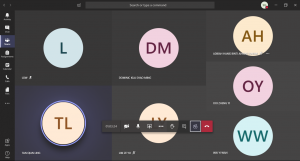
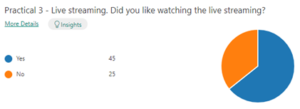
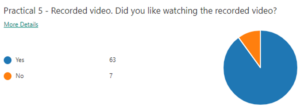
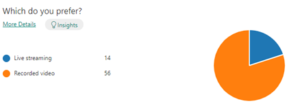
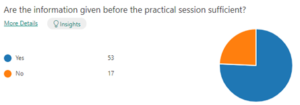
No approved comments.